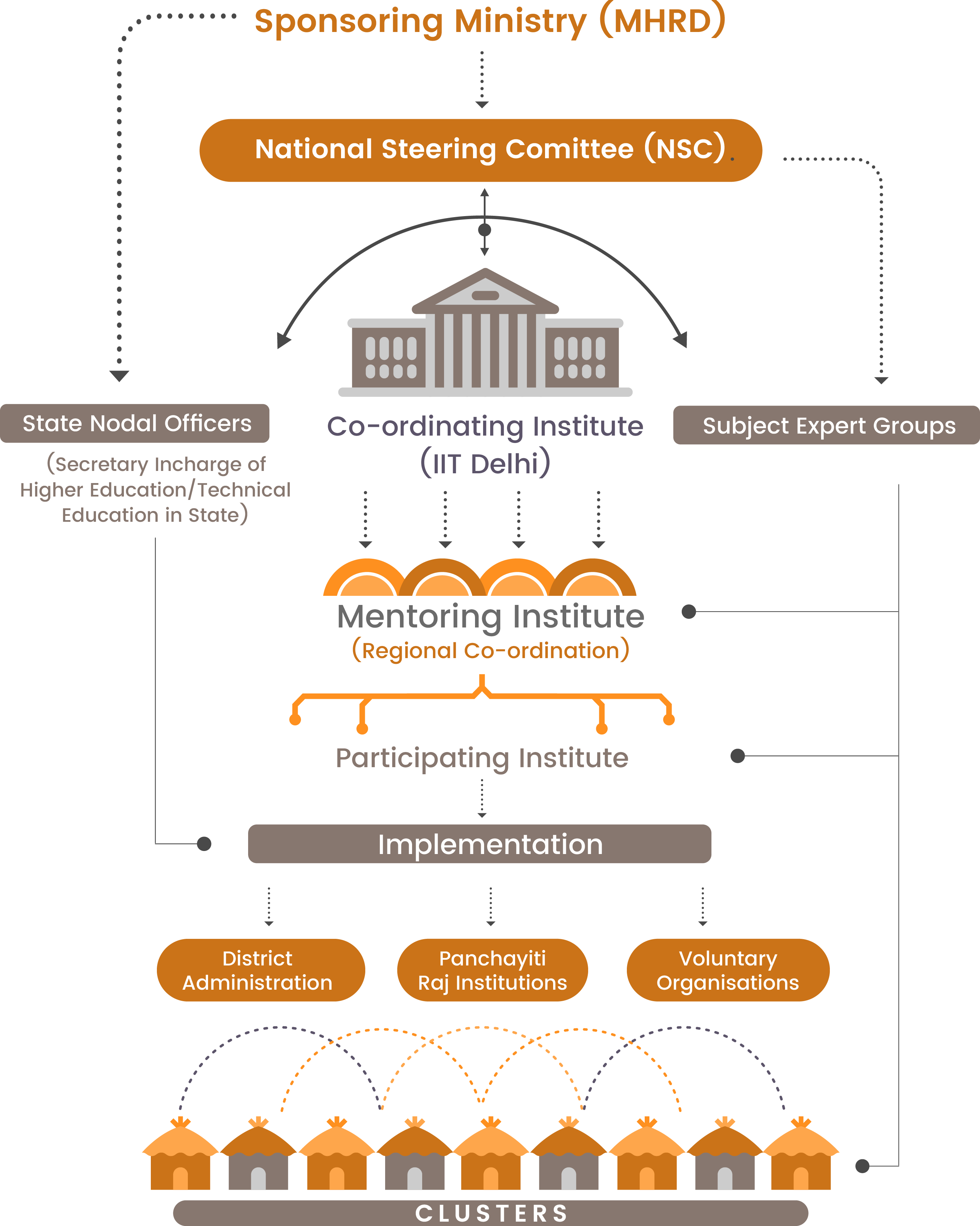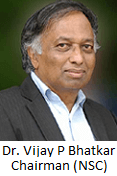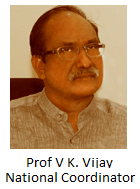
शिक्षित भारत-स्वस्थ भारत- स्वच्छ भारत- स्वावलंबी भारत- संपन्न भारत
Organizational Structure
In order to implement such an ambitious programme nationwide, it is essential to set-up an adequate structural network with a large number of nodal institutions and a proper mechanism to plan, execute and monitor the activities regularly to be able to create a tangible positive impact. It is also very important to facilitate synergetic collaboration between the concerned ministries, local Panchayat Raj Institutes (PRIs), voluntary organizations, and institutions participating in UBA. The following structure for this purpose has been visualized so far and is being created in a phase manner.

Sponsoring Ministry - MHRD
Basic funding for setting up the structural network of UBA and for orientation of UBA teams to enable effective participation i.e. establishing and running the UBA cells of CI, MIs and PIs is to be provided by the Ministry of HRD. In addition, the requisite funding for the working of subject expert groups for preparation of resource materials, training workshops, etc. will also need to be provided by the Ministry of HRD. The UBA cell in an Institute should identify a rural cluster (around 5 villages) for development work. The base-level funding from Ministry of HRD will be made available for setting up the necessary infrastructure/ manpower for the UBA Cell of the mentoring as well as the participating institutions.
National Steering Committee (NSC)
An empowered Steering Committee has been constituted by the Ministry of HRD for actual implementation, continuous guidance and monitoring of the programme at the national level. Dr. Vijay P. Bhatkar, an eminent scientist and rural development enthusiast has been designated as the Chairperson of the National Steering Committee (NSC) with stalwarts like Dr. Mashelkar (Ex Director General, CSIR), Dr. Ved Prakash (Ex-Chairman, UGC) and Dr. Sahasrabudhe (Chairman, AICTE) and others as the members. The first meeting of the NSC was held at IIT Delhi on 29th April, 2016 and it was decided that the NSC will be meeting quarterly to provide direction and requisite thrust to the programme. The coordinators of the overall coordinating institute, the mentoring institutes and the subject expert groups will be regularly reporting to the NSC.
Coordinating Institute (CI)
As already indicated, IIT Delhi has been designated to be the Coordinating Institute (CI) for the Unnat Bharat Abhiyan (UBA). In this capacity, IIT Delhi has been taking initiative to convene various consultative workshops and meetings. It has established the UBA Cell consisting of an Advisory Committee, an Executive Committee and a Core Working Group consisting of about forty faculty members drawn from various departments and centres of the institute. The Centre for Rural Development & Technology (CRDT) as well as the RuTAG group of IIT Delhi are fully participating in the UBA activities. It has also identified a few rural clusters for direct intervention and is in the process of networking with various participating institutions and voluntary organizations.
The main task of the coordinating institute will be to facilitate mutual interaction, consultation, responsibility allocation and an active liaison among the mentoring institutions, the subject expert groups as well as the Ministry of HRD. It will also closely interact with the NSC in connection with the allocation of funds and other facilitating measures for effective and smooth running as well as the nation-wide proliferation of the UBA program. Needless to mention, this coordination responsibility will be carried out along with the core responsibility of direct cluster intervention and conducive ethos development within the Institute.
Mentoring Institutions (MIs)
At present, majority of professional institutions do not have any prior experience, mechanism or expertise for meaningful interaction in the rural development process beyond their marginal interaction through National Service Scheme (NSS) activities. However, a few apex institutions (e.g. IISc Bangalore, IIT Mumbai, IIT Delhi and IIT Kharagpur) have been actively involved in the development and dissemination of appropriate technologies in the rural areas and have also interacted with voluntary organizations as well as selective government agencies in this process. These institutions also have established centers focusing on rural technology and development. Accordingly, they have the necessary expertise and wherewithal and therefore, can act as Mentoring Institutions (MIs) to facilitate the other participating institutions in their vicinity. It will be desirable to identify such mentoring institutions which can act as nodal centers for networking, training and orientation for grooming other institutions. In the first phase, fifteen such institutions have been identified to begin with, but many more institutions will be needed to provide a proper spread to the programme.
Subject Expert Groups (SEGs)
In order to develop the necessary resource material including the vision, methodology of intervention, prospective technologies and success stories in the specific areas of interventions, it was proposed by the apex committee that nationwide subject expert groups (SEGs) be developed in these specialized areas. Initially, ten broad subject areas were designated tentatively and specific institutions were nominated to coordinate the activity of formation of SEGs drawing experts from academia, industry as well as from field organizations who have had long experience of applied R&D and successful field intervention in these areas.
After thorough brainstorming on these subject themes with the prospective coordinators, twelve subject expert group themes, with coordinators and coordinating institutes were finalized in the workshop held in November, 2015 at IIT Delhi. The SEGs will have the responsibility of developing the necessary resource material for the benefit of all the UBA cluster teams. These experts will also conduct training workshops and indicate innovative.
Participating Institutions (PIs)
All participating institutions (PIs) are expected to establish a UBA Cell which will be responsible for carrying out the activities of the UBA. This will involve the development of an active working group consisting of motivated faculty members drawn from various disciplines. To guide and monitor the activities of the UBA Cell in each institution, there will be an Executive Committee and a local advisory committee (which will be chaired by the Head of the Institution).
The main responsibility of a UBA cell will be primarily to develop linkage with selective rural clusters, involve in the planning process and to promote the requisite S&T interventions to improvise and expedite the developmental efforts in those clusters. On the other hand, a UBA cell will also be responsible for developing the competence of its working group by appropriate orientation, training and creation of appropriate ethos within the institution towards indigenous and sustainable rural development, and initiating requisite curricular modifications and other facilitating measures.
All participating institutions will be facilitated and mentored in their activities by the respective mentoring institutions in their region.
State Nodal Officers
Secretaries In charge of higher education/Technical Education in all state governments will act as State Nodal Officer. They will have the responsibility of facilitating and monitoring the interaction of institutions with PRIs/District Administration. They will coordinate the effort at the state level by involving the Panchayati Raj and Rural Development, SC Development, ST Development, Drinking Water, Agriculture, Animal Husbandry, Power, IT and Science & Technology Departments of the state and chalk out the plan of action for the state.


